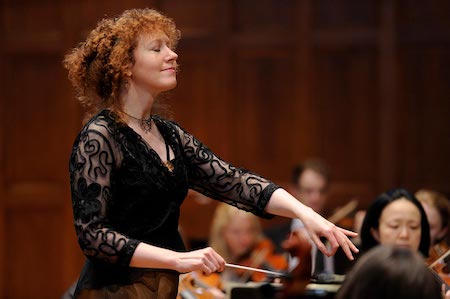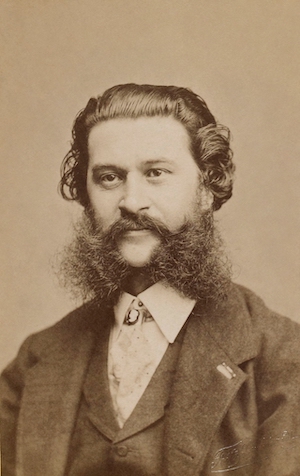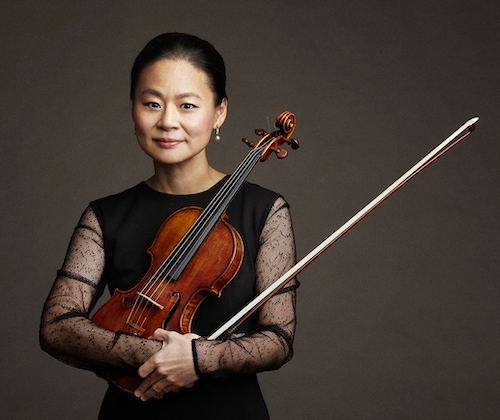by Jarrett Hoffman

•Opportunities for conductors, string players, and high-school band students
•Tickets for Oberlin Orchestra’s visit to Carnegie Hall
•Almanac: Strauss Jr.’s Blue Danube, Bizet’s Carmen, and Midori — from child prodigy to the present day
OPPORTUNITIES & ANNOUNCEMENTS:
Apollo’s Fire invites emerging and young professional conductors to a workshop centered around Handel’s Messiah. Led by artistic director Jeannette Sorrell (pictured), the program takes place December 4-6, spanning from first rehearsal to performance. Register by November 30. More details here.
High-school band directors, take note: until November 23, the Kent State University band program will be accepting nominations for its All-Star Band. Students will work with guest conductors and KSU faculty as part of this honor band opportunity, which will take place January 13-14. Nomination form and more details can be found here.
There’s a new group in town, and a few seats still need to be filled. Music director Matthew Salvaggio and the Cleveland Repertory Orchestra are looking for violinists, violists — including a principal viola — and cellists, while other instrumentalists are invited to apply for the sub list. The ensemble’s inaugural season spans three concerts, and they rehearse on Monday evenings in Cleveland Heights. More information here.
And tickets are live for this January’s visit to Carnegie Hall by the Oberlin Orchestra, as well as several of the school’s choral ensembles and a handful of guest vocal soloists. The program includes Iván Enrique Rodríguez’s A Metaphor for Power, Brahms’ Tragic Overture, and Nathaniel Dett’s The Ordering of Moses. Get tickets here.
TODAY’S ALMANAC:

Strauss Jr. (pictured), that king of the waltz, is a composer whose music is widely known even among those who don’t know his name, thanks to ubiquitous pieces such as the The Blue Danube. And there’s a reason for the work’s ubiquitousness — gosh darn is it charming.
So closely associated with Austria, it’s considered an unofficial national anthem. And speaking of Austrians — Franz Welser-Möst leads the Vienna Philharmonic in a Blue Danube performance here.
Fun fact: the piece was originally written for choir, with a text by poet Joseph Weyl of the Vienna Men’s Choral Association, the group that gave the premiere. The instrumental version was an adaptation that Strauss made a year later, for the 1867 World’s Fair. Listen to a performance by the Vienna Boys Choir here.
Speaking of ubiquitous, ever heard of Carmen? Bizet wrote his final work three months before his death — at age 36 — and having first been panned by critics, the opera was then suddenly hailed for its genius. History is strange — but anyway, generations of audiences can certainly be happy things turned out how they did for this warhorse. Click here to watch Maria Callas sing the “Habanera” live in Hamburg in 1962.
Carmen is a useful transition to Midori — at the age of 16, she performed Sarasate’s Carmen Fantasy with Seiji Ozawa and the Boston Symphony, part of a birthday celebration for Leonard Bernstein. Watch here.
If it wasn’t already clear, Midori was born a child prodigy, making her public debut at the age of six. Her choice of repertoire? One of Paganini’s famously difficult Caprices. By her mid-teens, having just graduated from Juilliard Pre-College and moved into a full-time professional career, she already had a glittering resume, including performances with Zubin Mehta and the New York Philharmonic, and with Bernstein at Tanglewood.
As Michael Zwiebach writes in San Francisco Classical Voice, the years since have seen the violinist “deepen her artistry and repertory, found a nonprofit for educating underserved children in the U.S. and Japan in classical music, earn a master’s degree in psychology from NYU in 2005, while still performing, and become a highly beloved teacher” — she’s currently on the faculties of both USC and Curtis. She has also written a memoir, although it hasn’t yet been translated from German to English. (Someone out there, hop to it!)
Zwiebach also selects highlights from Midori’s extensive discography in that article, titled “The Essential Midori.” One recommendation: her 2017 performance of the Chaconne from Bach’s Partita No. 2, in a very fitting place. You’ll find out when you see it.




